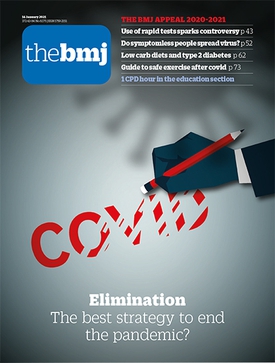Related Research Articles
Medical ethics is an applied branch of ethics which analyzes the practice of clinical medicine and related scientific research. Medical ethics is based on a set of values that professionals can refer to in the case of any confusion or conflict. These values include the respect for autonomy, non-maleficence, beneficence, and justice. Such tenets may allow doctors, care providers, and families to create a treatment plan and work towards the same common goal. It is important to note that these four values are not ranked in order of importance or relevance and that they all encompass values pertaining to medical ethics. However, a conflict may arise leading to the need for hierarchy in an ethical system, such that some moral elements overrule others with the purpose of applying the best moral judgement to a difficult medical situation. Medical ethics is particularly relevant in decisions regarding involuntary treatment and involuntary commitment.
BioMed Central (BMC) is a United Kingdom-based, for-profit scientific open access publisher that produces over 250 scientific journals. All its journals are published online only. BioMed Central describes itself as the first and largest open access science publisher. It was founded in 2000 and has been owned by Springer, now Springer Nature, since 2008.

The BMJ is a weekly peer-reviewed medical journal, published by BMJ Group, which in turn is wholly-owned by the British Medical Association (BMA). The BMJ has editorial freedom from the BMA. It is one of the world's oldest general medical journals. Previously called the British Medical Journal, the title was officially shortened to BMJ in 1988, and then changed to The BMJ in 2014. The journal is published by BMJ Publishing Group Ltd, a subsidiary of the British Medical Association (BMA). The current editor-in-chief of The BMJ is Kamran Abbasi, who was appointed in January 2022.
A public health journal is a scientific journal devoted to the field of public health, including epidemiology, biostatistics, and health care. Public health journals, like most scientific journals, are peer-reviewed. Public health journals are commonly published by health organizations and societies, such as the Bulletin of the World Health Organization or the Journal of Epidemiology and Community Health. Many others are published by a handful of large publishing corporations that includes Elsevier, Wolters Kluwer, Wiley-Blackwell, Springer Science+Business Media, and Informa, each of which has many imprints. Many societies partner with such corporations to handle the work of producing their journals.
Wolters Kluwer N.V. is a Dutch information services company. The company serves legal, business, tax, accounting, finance, audit, risk, compliance, and healthcare markets.
The Declaration of Helsinki is a set of ethical principles regarding human experimentation developed originally in 1964 for the medical community by the World Medical Association (WMA). It is widely regarded as the cornerstone document on human research ethics.
Lippincott Williams & Wilkins (LWW) is an American imprint of the American Dutch publishing conglomerate Wolters Kluwer. It was established by the acquisition of Williams & Wilkins and its merger with J.B. Lippincott Company in 1998. Under the LWW brand, Wolters Kluwer, through its Health Division, publishes scientific, technical, and medical content such as textbooks, reference works, and over 275 scientific journals. Publications are aimed at physicians, nurses, clinicians, and students.

Diana M. Zuckerman is an American health policy analyst who focuses on the implications of policies for public health and patients' health. She specializes in national health policy, particularly in women's health and the safety and effectiveness of medical products. She is the President of the National Center for Health Research and the Cancer Prevention and Treatment Fund.
The Norwegian Electronic Health Library (Helsebiblioteket.no), established 2006, is a publicly funded web based knowledge service that provides Norwegian health workers with access to updated professional information and clinical decision tools.

The American Academy of Neurology (AAN) is a professional society representing over 40,000 neurologists and neuroscientists. As a medical specialty society it was established in 1948 by A.B. Baker of the University of Minnesota to advance the art and science of neurology, and thereby promote the best possible care for patients with neurological disorders. It is based in Minneapolis, Minnesota, with a health policy office in Washington, DC.

Arthur Schafer is a Canadian ethicist specializing in bioethics, philosophy of law, social philosophy and political philosophy. He is Director of the Centre for Professional and Applied Ethics, at the University of Manitoba. He is also a full professor in the Department of Philosophy and an ethics consultant for the Department of Paediatrics and Child Health at the Health Sciences Centre in Winnipeg. For ten years he was head of the Section of Bio-Medical Ethics in the Faculty of Medicine of the University of Manitoba. He has also served as visiting scholar at Green College, Oxford.
Fiona Godlee was editor in chief of The British Medical Journal from March 2005 until 31 December 2021; she was the first female editor appointed in the journal's history. She was also editorial director of the other journals in BMJ's portfolio.
Arteriosclerosis, Thrombosis, and Vascular Biology (ATVB) is a peer-reviewed medical journal published on behalf of the American Heart Association by Lippincott Williams & Wilkins, an imprint of Wolters Kluwer. It covers basic and clinical research related to vascular biology, pathophysiology and complications of atherosclerosis, and thrombotic mechanisms in blood vessels.
Clinical peer review, also known as medical peer review is the process by which health care professionals, including those in nursing and pharmacy, evaluate each other's clinical performance. A discipline-specific process may be referenced accordingly.
Lexicomp is a company that offers services, that provide access to a database containing information about medical drugs. The company's products include mobile apps, Lexicomp Online, reference handbooks, and desktop software.

The Wikipedia online encyclopedia has, since the late 2000s, served as a popular source for health information for both laypersons and, in many cases, health care practitioners. Health-related articles on Wikipedia are popularly accessed as results from search engines, which frequently deliver links to Wikipedia articles. Independent assessments have been made of the number and demographics of people who seek health information on Wikipedia, the scope of health information on Wikipedia, and the quality and reliability of the information on Wikipedia.

AllTrials is a project advocating that clinical research adopt the principles of open research. The project summarizes itself as "All trials registered, all results reported": that is, all clinical trials should be listed in a clinical trials registry, and their results should always be shared as open data.

Conflicts of interest (COIs) often arise in academic publishing. Such conflicts may cause wrongdoing and make it more likely. Ethical standards in academic publishing exist to avoid and deal with conflicts of interest, and the field continues to develop new standards. Standards vary between journals and are unevenly applied. According to the International Committee of Medical Journal Editors, "[a]uthors have a responsibility to evaluate the integrity, history, practices and reputation of the journals to which they submit manuscripts".
References
- ↑ Rose, Burton. "The UpToDate Story". YouTube. UpToDateEBM. Archived from the original on 2013-08-20. Retrieved 12 July 2015.
- ↑ Amber, Kyle T; Dhiman, Gaurav; Goodman, Kenneth W (3 February 2014). "Conflict of interest in online point-of-care clinical support websites". Journal of Medical Ethics . BMJ Publishing Group. 40 (8): 578–580. doi:10.1136/medethics-2013-101625. PMID 24493079. S2CID 36002285 . Retrieved 19 September 2015.
- ↑ "UpToDate Online". store.uptodate.com. Retrieved 2021-08-16.
- ↑ "UpToDate - Hvordan få tilgang". Helsebiblioteket (in Norwegian). Retrieved 2023-08-14.
- ↑ Helsebiblioteket.no. "The Norwegian Electronic Health Library – information in English". Helsebiblioteket.no (in Norwegian). Retrieved 2021-08-16.
- ↑ "UpToDate Provides Free Access to Its Medical Content to All Users in Japan" . Retrieved 15 November 2015.
- ↑ "UpToDate International Grant Subscription Program" . Retrieved 15 November 2015.